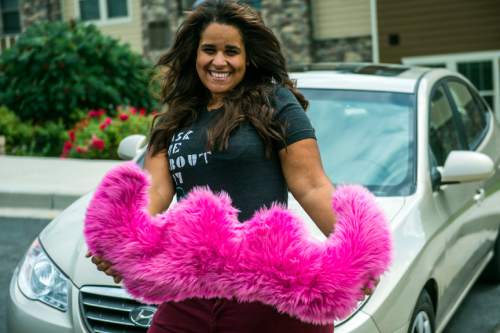This is an archived article that was published on sltrib.com in 2014, and information in the article may be outdated. It is provided only for personal research purposes and may not be reprinted.
Rideshare companies Uber, Lyft and Sidecar threw down the gauntlet Monday to the Salt Lake City Council: If you pass that proposed ordinance, we'll pack up our smartphone app and leave town.
In full page ads in The Salt Lake Tribune and Deseret News, the rideshare enterprises warned the council that if it passes proposed amendments to the ground-transportation ordinance, it would send a message that the city is closed to innovation.
In interviews Monday, Uber and Lyft told The Tribune that approval of the new regulations would prompt the new services to abandon Salt Lake City.
The vote is scheduled for Nov. 25 at 7 p.m. at City Hall, 451 S. State.
The ads, purchased by The Internet Association on behalf of Uber, Lyft and Sidecar, said the amendments constitute "onerous, duplicative and costly regulations that provide no additional benefit or safety for consumers."
"If the City Council votes for the [amendments to] the ordinance we don't have any plan to go through licensing because it wouldn't allow the model to succeed," said Lyft spokesman David Mack.
Two major sticking points are city-mandated driver background checks and vehicle inspections. The rideshare companies say they already do those things.
"The platform pays a lot of costs traditionally paid by taxpayers," Mack said. "And it has to be easy for the part-time drivers to participate."
But Monday afternoon, Council Chairman Charlie Luke said that what the municipality requires to ensure public safety "is not unreasonable."
"We are applying regulations for ground-transportation companies," he said. "Uber and Lyft are ground-transportation companies."
Further, Luke said that Uber and Lyft lost credibility by beginning operations illegally in Salt Lake City during the past year. Nonetheless, the city has worked with them to legalize their operations, he said.
The municipality waived its 30-minute waiting period and $30 minimum limousine fee to accommodate them, Luke noted.
But the city's background checks and vehicle inspection will stay.
"We owe it to our residents and those who travel here that there is a certain level of safety," Luke said. "Salt Lake City can't just pull the blanket over our heads."
But Mack counters that rideshare is an innovative way to fill the holes in Salt Lake City's public-transit system and ought not to be bound by the same regulations as taxis.
"Many states and cities realize a different model requires different rules," he said. "We're encouraging the City Council and Mayor [Ralph Becker] to take a little more time. Other cities have found a way to make it work."
But taxi-cab companies countered that they should not be held to stricter regulation than rideshare.
Former Mayor Rocky Anderson, who represents Yellow Cab, faulted the amendments for not mandating, as the ordinance does for taxi cabs, that ride-share companies be available 24 hours a day and be accessible to the disabled. He also faults the companies for not taking cash.
"This is the most irresponsible, oppressive, corporate campaign in the country," he said. "It's a Walmart consumer frame of mind," he said of ride-share users. "They don't realize they are shafting the people without credit cards or the disabled."
Further, Anderson said rideshares aren't insured like taxi cabs.
Citing the user agreements of Uber and Lyft, Anderson said neither company accepts liability because transactions are between the rider and the driver — rather than the companies themselves.
"Riders should know that when they get into one of these cars, they are risking everything," Anderson said. "If they are injured, it's very different than if they were injured in a cab because in a cab they haven't signed their life away."
According to Uber's website regarding terms and conditions for drivers: "Uber shall not have any liability arising from or in any way related to your transaction or relationship with a third party."
But Michael Amodeo, a spokesman for Uber, said Monday the company carries a $1 million policy that covers drivers and riders during the full extent of a trip.
"Our top priority is safety," he said, noting that the company's background checks go back seven years and include federal, state and local records.
Further, Uber requires a 19-point safety inspection that he said is more thorough than that of Salt Lake City.
Amodeo noted that rideshare is quickly gaining popularity because it serves a need, is convenient and economical.
"It's different than taxis and requires a different regulatory approach," he said.
Upcoming vote
The Salt Lake City Council vote on new regulations for ground transportation is scheduled for Nov. 25 at 7 p.m. at City Hall, 451 S. State.



